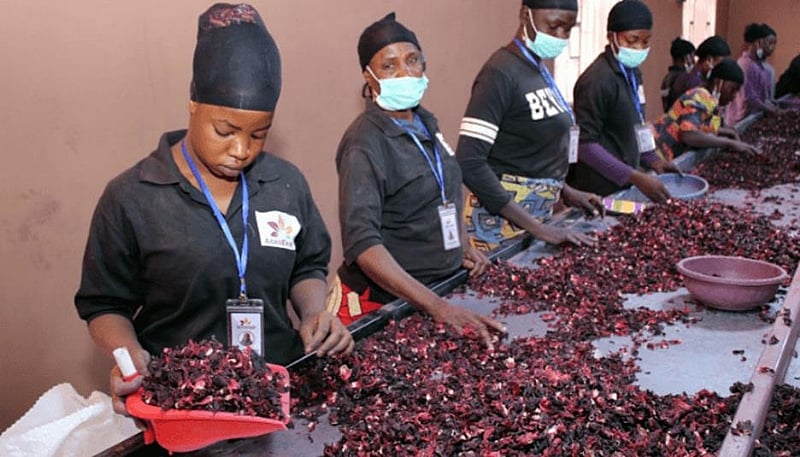Hibiscus, known locally in Ghana as “sobolo,” presents a significant economic opportunity for the nation, leveraging both domestic popularity and expanding international demand. This versatile plant offers a pathway to substantial revenue generation through various avenues, from raw material export to value-added product development, impacting job creation, supporting small-scale farmers, and bolstering the agro-processing sector. This potential is further amplified by the growing global health and wellness trend, increasing culinary applications, and the burgeoning opportunities presented by the African Continental Free Trade Area (AfCFTA).
The international market for hibiscus is experiencing robust growth, projected to reach $211.7 million by 2028. This increasing demand, driven by health benefits and culinary applications, is evident in major importing countries like Germany, the USA, and Mexico. These markets primarily utilize dried hibiscus flowers for teas, syrups, and other food and beverage applications. The increasing popularity of hibiscus as a natural ingredient in the food, beverage, pharmaceutical, and personal care industries fuels this continued expansion, creating a lucrative opportunity for hibiscus-producing nations like Ghana.
Ghana can maximize its returns from hibiscus by moving beyond the export of raw dried flowers and focusing on the development of value-added products. Processing hibiscus locally into teas, powders, syrups, and cosmetics allows Ghana to capture a larger share of the profit margin. For example, hibiscus tea commands significantly higher prices in international markets compared to raw hibiscus. Similarly, the incorporation of hibiscus extracts in the rapidly expanding natural skincare market provides another avenue for high-value product development. This shift towards value addition will not only boost revenue but also foster the growth of small and medium-sized enterprises (SMEs) capable of producing and marketing branded hibiscus products.
Cultivating and processing hibiscus offers substantial potential for job creation throughout the value chain. From planting and harvesting to drying and processing, hibiscus farming can generate numerous employment opportunities, particularly in rural areas. This mirrors the success seen in Nigeria, where hibiscus production employs a significant portion of the agricultural workforce and contributes to rural development. Ghana can replicate this model by promoting hibiscus farming as a key cash crop, thereby reducing rural unemployment and improving livelihoods. The relatively low production costs and suitability to Ghana’s climate make hibiscus an ideal crop for small-scale farmers, further enhancing its potential for poverty reduction and economic empowerment.
Hibiscus presents an ideal crop for small-scale farmers due to its low input requirements and adaptability to Ghana’s climate. The minimal need for fertilizers and its resilience in seasonal rainfall conditions make it a cost-effective crop to cultivate. This translates to potentially significant earnings for farmers, further incentivizing hibiscus production. By investing in farmer training programs and ensuring access to necessary inputs, Ghana can empower small-scale farmers to fully capitalize on the economic potential of hibiscus cultivation, mirroring the success achieved by Nigerian farmers exporting significant quantities of hibiscus annually.
The development of the hibiscus industry aligns perfectly with Ghana’s focus on boosting its agro-processing sector. The government’s One District, One Factory (1D1F) initiative provides a framework for establishing hibiscus processing plants, adding value to the raw product and increasing export earnings. By processing hibiscus locally into finished products, Ghana can significantly enhance the value of its exports, similar to the success seen in Kenya’s hibiscus tea industry. Furthermore, establishing regional processing hubs can minimize post-harvest losses, a significant challenge for Ghanaian agriculture, and ensure a higher quality product for both domestic and international markets.
Hibiscus’s rich antioxidant content, blood pressure-lowering properties, and anti-inflammatory benefits position it perfectly within the rapidly growing global health and wellness market. This trend towards natural and organic products presents a unique marketing opportunity for Ghana. By branding hibiscus products as organic and highlighting their health benefits, Ghana can target health-conscious consumers both domestically and internationally. This focus on health and wellness can further enhance the value of Ghanaian hibiscus products and create a niche market for premium offerings. Leveraging the growing global demand for natural remedies and healthy beverages, Ghana can position its hibiscus products as a desirable alternative for consumers seeking natural health solutions. This approach can also contribute to raising awareness about the health benefits of hibiscus and promoting its wider adoption.














